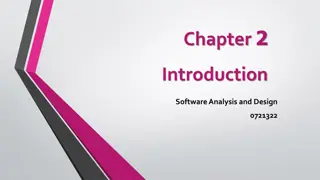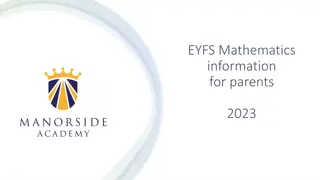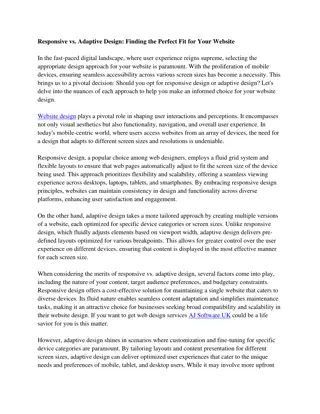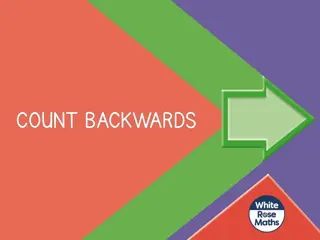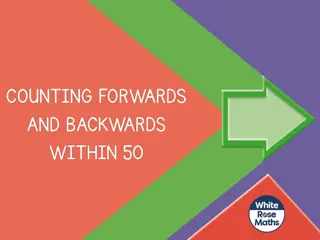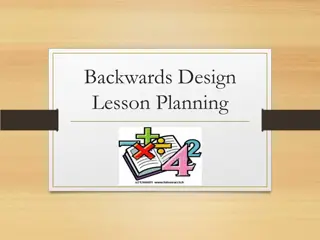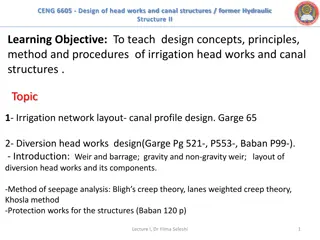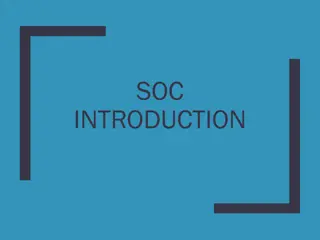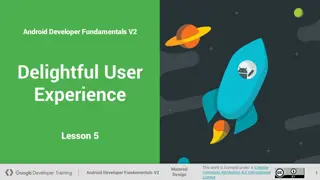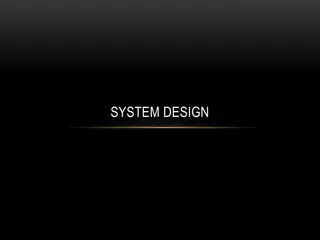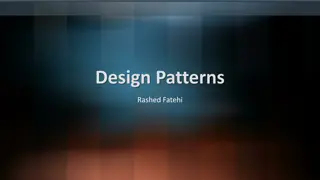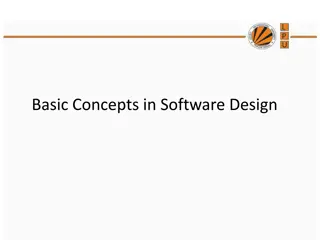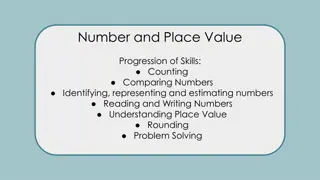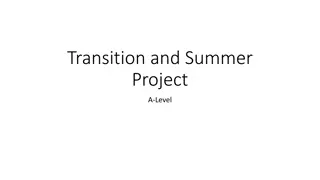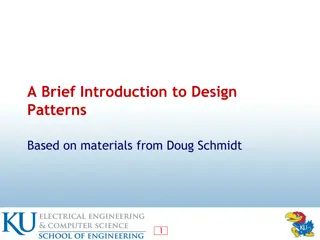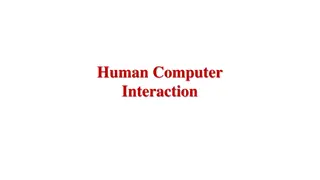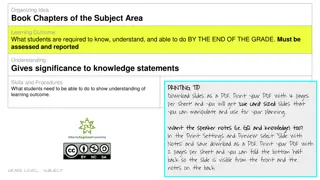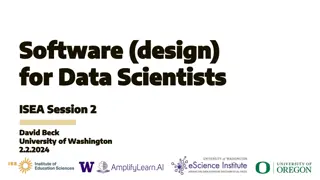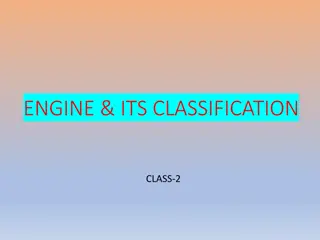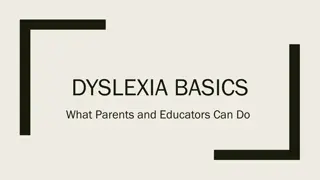Innovative Approaches to Child Protection Information Management in Emergencies
This presentation discusses the collaboration between Child Protection and Information Management colleagues in emergency situations. It covers identifying information needs, methods for cooperation, and obtaining relevant data. The session highlights starting from decisions, walking backwards to fi
0 views • 66 slides
GCSE Design Technology Knowledge Organiser and Course Structure Overview
In this detailed knowledge organiser, find information about the GCSE Design Technology course structure, learning objectives, mission statement, and core technical principles for KS4 students. The course emphasizes iterative design cycles, creative thinking, problem-solving, and addressing environm
7 views • 53 slides
Software Analysis and Design Process
Software analysis and design involve a systematic approach to understanding user requirements, creating logical models, and transitioning to detailed design specifications. Requirements analysis focuses on capturing system requirements, while design translates these requirements into implementation
8 views • 16 slides
Early Years Foundation Stage Mathematics Information for Parents 2023
In the Early Years Foundation Stage (EYFS), children are taught Mathematics following the DFE Statutory Framework and Development Matters Guidance. The focus areas include Number and Numerical Patterns. By the end of the Reception year, children are expected to achieve various skills such as underst
2 views • 21 slides
Textil School for Design, Technology, and Management - Overview
The Textil School for Design, Technology, and Management is a renowned institution funded by the European Union. Offering undergraduate applied studies in Textile and Apparel Design, Textile Engineering, and Management in the Textile Industry, the school focuses on artistic expression, modern method
0 views • 16 slides
If you are searching for Architectural Design in Takapūwāhia
If you are searching for Architectural Design in Takap\u016bw\u0101hia, At HWA - Architecture, we bring years of experience in Architectural Design to projects across New Zealand. With ongoing projects in Otago, Canterbury, Waikato, Kapiti, and Horowhenua, we have established ourselves as a trusted
1 views • 6 slides
Exploring Graphic Design Jobs Near Me: Opportunities and Insights
\n In today's visually-driven world, graphic design plays a crucial role in shaping the identity and communication of businesses, organizations, and brands. From logos and branding materials to digital assets and marketing collateral, the demand for skilled graphic designers continues to grow. If yo
1 views • 9 slides
Responsive vs. Adaptive Design: Finding the Perfect Fit for Your Website
In the fast-paced digital landscape, where user experience reigns supreme, selecting the appropriate design approach for your website is paramount. With the proliferation of mobile devices, ensuring seamless accessibility across various screen sizes has become a necessity. This brings us to a pivota
1 views • 2 slides
Counting and Number Recognition Activities
Engage in a variety of counting and number recognition activities, including identifying numbers, counting backwards, and identifying missing numbers on number tracks. These fun exercises encourage children to practice their counting skills and improve their number recognition abilities.
0 views • 13 slides
Math Worksheet for Counting Practice
Engage in counting exercises with visual aids such as number tracks, spotting mistakes, and identifying missing numbers. Enhance counting skills forwards and backwards. Practice identifying numbers before and after given ones through interactive tasks.
0 views • 17 slides
Links in Textual Content
Learn how to identify and analyze links between ideas in a text by examining how specific sentences provide connections. Follow a structured approach of quoting, explaining, and analyzing words that link backwards and forwards to establish a clear understanding of the text's coherence.
2 views • 21 slides
Guidelines for Design of Cement Concrete Pavement and Interlocking Paver Blocks
This document provides guidelines for designing cement concrete pavements and interlocking paver blocks, covering factors governing design, wheel loads, design period, subgrade characteristics, approximate k values based on CBR values, and the importance of a sub-base below concrete pavements. It em
0 views • 67 slides
Effective Lesson Planning through Backwards Design Approach
Explore the key concepts of effective lesson planning using the backwards design approach. Learn how to begin with identifying student needs, set clear objectives, develop engaging activities, and assess learning outcomes. Avoid common pitfalls in lesson planning and enhance student achievement by p
0 views • 14 slides
Software Engineering Design Principles and Concepts
The chapter discusses the essential principles and concepts in software design, highlighting the four key design models - data design, architectural design, interface design, and component-level design. It emphasizes the importance of traceability to the analysis model, minimizing the gap between so
2 views • 36 slides
Design of Head Works and Canal Structures - Learning Objectives and Evaluation
This course covers the design concepts, principles, methods, and procedures related to the design of irrigation head works and canal structures. Topics include irrigation network layout, diversion head works design, seepage analysis methods, protection works, canal profile design, canal head regulat
0 views • 4 slides
Building and Programming Self-Driving Robot Car with Elegoo Robot
Join the workshop to build and program a self-driving car using the Elegoo Robot and TinkerCAD Circuits. Learn to code functions for driving forward, left, right, backwards, and stopping. Complete the bronze, silver, and gold challenges to enhance your text programming skills. Get started with the c
1 views • 11 slides
Mathematical Vocabulary for Describing Movement in Year 2 Curriculum
Explore and enhance mathematical vocabulary skills for describing movement in Year 2 with concepts like forwards, backwards, up, down, left, right, and movement in a straight line. Engage in activities focusing on direction, distance, and turns, including quarter, half, and three-quarter rotations i
1 views • 33 slides
System on Chip (SoC) Design and Components
Explore the world of System on Chip (SoC) design, components, and working flow. Learn about Intellectual Properties (IP), platform-based design, typical design flows, top-down design approach, and the emerging Electronic System Level (ESL) design flow. Discover the essential components of an SoC, su
0 views • 45 slides
Design Inspiration and Elements in Costume and Fashion Design
Dive into the world of costume and fashion design through a visual journey of finding design inspiration, understanding the design process, emphasizing originality, and exploring different sources of creativity. Discover how technology, art, food, history, architecture, and nature can spark innovati
0 views • 45 slides
Enhancing Piping Design Efficiency with Spec-Driven Technology
Explore how Spec-Driven Piping technology powered by CADACTIVE offers a standardized approach for piping design in Creo Parametric. This innovative extension streamlines design communication, eliminates errors, and improves design efficiency by utilizing a master catalog, automated checking capabili
0 views • 15 slides
Material Design: Combining Classic Design Principles with Technological Innovation
Material Design is a design language that combines traditional design principles with the possibilities offered by technology and science. It emphasizes visual language, classic design elements, and innovation to create delightful user experiences. The Material Metaphor, Imagery, Typography, Color,
0 views • 34 slides
Comprehensive Guide to System Design Components and Techniques
System design involves the detailed planning and identification of components in an information system, aiming to provide users with a general understanding of the new system. This process includes techniques like flowcharts, prototyping, and component design, covering aspects such as output design,
0 views • 24 slides
Design Patterns: A Comprehensive Overview
Exploring the world of design patterns, this content delves into the essence of design patterns, their application in software design to resolve complexity, and the different types of design patterns - creational, structural, and behavioral. It also showcases examples of popular design patterns such
0 views • 22 slides
Fun with Numbers: Counting and Equations Exploration
Dive into a series of engaging activities involving counting from 1 to 30, counting backwards from 10 to 0, and exploring number relationships through simple equations such as "One more than 2 is 3" and "One more than 3 is…". Visualize the concepts through colorful images and enjoy learning about
0 views • 10 slides
Basic Concepts in Software Design
Software design involves transforming customer requirements into a form suitable for implementation, with activities categorized into preliminary and detailed design stages. High-level design focuses on module identification and control relationships, while detailed design entails defining data stru
1 views • 24 slides
Recent Developments in English Law of Tracing & Unjust Enrichment
Recent decisions in English law show a shift in tracing & unjust enrichment practices. Cases like Brazil v. Durant and Bank of Cyprus v. Menelaou indicate a move towards a looser causal connection requirement. The discussion on backwards tracing and unjust enrichment has evolved from the Court of Ap
0 views • 18 slides
Progression of Number and Place Value Skills Across Grade Levels
Explore the progression of skills related to number and place value, including counting, comparing numbers, identifying digits, reading and writing numbers, understanding place value, rounding, and problem-solving. The curriculum spans Year 1 to Year 6, covering topics such as counting forwards and
0 views • 5 slides
3D Design and Critical Analysis in Architecture
Dive into the world of 3D design and critical analysis with a focus on architecture. Discover the stages of design, essential skills for designers, and areas of study in three-dimensional design. Delve into iconic buildings like Frank Lloyd Wright's Falling Water, analyze their key features, and eve
0 views • 9 slides
Design Patterns in Object-Oriented Design
Design patterns in object-oriented design (OOD) are essential templates that codify best practices for solving common problems. They help streamline development by capturing proven design decisions, promoting code reuse, and enhancing system flexibility and modularity. Learn about the core concepts,
0 views • 20 slides
Interaction Design in Human-Computer Interaction
Interaction design focuses on creating interactive products that are easy, effective, and enjoyable to use. It aims to reduce negative user experiences while enhancing positive ones. Designing interactive products requires understanding user activities, interfaces, and device arrangements to support
0 views • 11 slides
SEAL Maths in Currie Nursery: A Pedagogical Approach to Early Arithmetical Learning
SEAL Maths, a prominent program in City of Edinburgh, focuses on stages of early arithmetical learning, emphasizing understanding, strategies, and mental agility. The curriculum includes emergent to facile stages with activities like forward/backwards number word sequence, numeral recognition, and a
0 views • 15 slides
SE2811 Software Component Design Overview
This course covers software component design, design patterns, object-oriented design, algorithms, and opportunities for reuse in systems design. It emphasizes the importance of domain-level design and provides insights into solving core problems through reusable classes.
1 views • 21 slides
Analysis of Bunch Lengthening in CEPC for Different Design Parameters
This study explores bunch lengthening in the Circular Electron Positron Collider (CEPC) for various design parameters, analyzing a 54 km design scheme, a 61 km design scheme, and a 100 km design scheme. The analysis includes the theoretical framework used, equations for bunch lengthening, and conclu
1 views • 15 slides
Plain & Reinforced Concrete Structures in Design Engineering
In the design of Plain & Reinforced Concrete structures, various strength design methods such as Ultimate Strength Design (USD) and Allowable Strength Design (ASD) are utilized. These methods involve factors of safety, material strength, load factors, and analysis in the elastic range. Additionally,
0 views • 11 slides
Verilog Adder Examples & Typical IC Design Flow
This comprehensive content delves into Verilog adder examples, typical IC design flow, physical design considerations, and examples of OpenGL ES GPU and ARM hypervisor applications. It covers the fundamentals of digital logic with Verilog design, hardware description language, FPGA prototyping, phys
1 views • 27 slides
Grade One Math Learning Outcomes: Quantity Interpretation and Manipulation
Grade One Math curriculum focuses on developing students' ability to interpret and explain quantities up to 100. Students learn to represent quantities using words, numerals, objects, and pictures. They also understand counting principles, such as hierarchical inclusion, and learn to count forwards
0 views • 17 slides
The Importance of Software Design for Data Scientists
Today's ISEA Session 2 with David Beck from the University of Washington delves into the critical role of intentional software design for data scientists. The session covers the software design approach, user-centric design stories, use cases, components, testing strategies, and the benefits and dra
1 views • 76 slides
Engine Classification and Design
Engine classification involves categorizing engines based on various factors such as combustion type, number of strokes, cylinder design, and ignition method. Common classifications include external and internal combustion engines, as well as categories based on the design and use of the engine. Add
0 views • 11 slides
Teaching with Sustainability: Enhancing Educational Practices
This course, offered by MIT in January 2022, explores sustainability education and effective teaching practices. Topics include theoretical frameworks, sustainability literacy, instructional approaches, and more. Participants will consider modifying their content and practices using a backwards desi
0 views • 30 slides
Dyslexia: What Parents and Educators Can Do
Dyslexia is a specific learning disability of neurobiological origin, characterized by difficulties in word recognition, spelling, and decoding. It stems from a deficit in the phonological component of language, impacting reading comprehension and vocabulary growth. Proper support and effective clas
0 views • 21 slides


